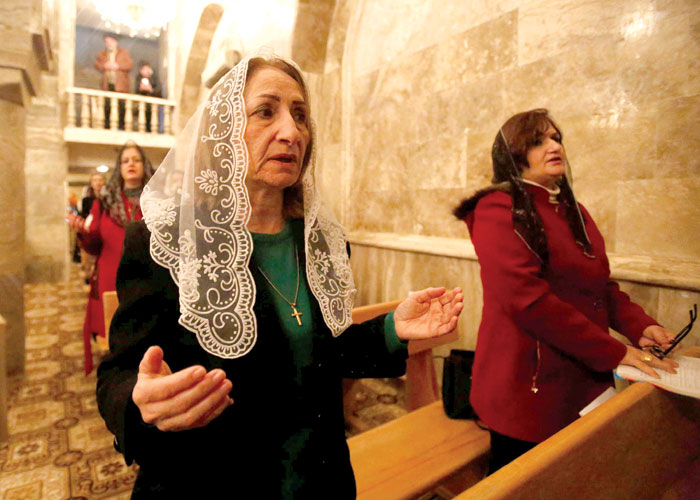Middle East Christians remain hopeful for the future despite ISIS violence in 2016
Amr Emam/The Arab Weekly/January 15/17/
While Christian exodus from Syria continues, one needs only to look next door to Lebanon for positive signs of Christian and Muslim coexistence.
Cairo – Christians in the Middle East appear to be clinging to a renewed sense of hope in the new year as the Islamic State (ISIS) and other militant Islamist groups lose ground.
“Most Middle East Christians underwent tragic experiences in 2016 as they continued to escape, especially from restive countries like Syria and Iraq, in pursuit of safety in Europe,” said Sameh Fawzi, a former adviser to the Egyptian Coptic pope.
“True, there is still fear within Christian circles in the region that the same suffering will continue in the new year but there is hope as well,” he added, recalling the December bombing that killed 26 people in a Coptic church in Cairo. The attack was claimed by ISIS.
Christians, the largest religious minority in Egypt, represent almost 12% of the population. Egypt’s new parliament has 36 Christian members, out of a total of 596, the largest Christian representation ever.
Adding to the Christians’ optimism has been the Egyptian government’s approval of a long-awaited law to allow them to build churches. The law removes many hindrances that stymied church construction and renovation in Egypt.
“The law has had a positive effect on Christians and showed them that they live in a country that views them as equal to their Muslim compatriots,” said Christian researcher Ishaq Ibrahim. “Such laws contribute to the empowerment of this country’s Christians.”
In the occupied Palestinian territories, Muslims and Christians displayed greater unity against the Israeli occupation last year and inside Israel itself Christians and Muslim Arabs often fight the same anti-discrimination battles.
Prolific attacks against Christians in restive Arab countries gave rise to international calls for labelling atrocities committed against them as genocide. Some Christian charities and Western politicians expressed fear for the future presence of Christians in war-torn countries Syria and Iraq.
While the Christian exodus from Syria continues, especially in areas occupied by militant and radical groups fighting the army of President Bashar Assad, one needs only to look next door to Lebanon for positive signs of Christian and Muslim co-existence.
Lebanon is the only Arab country that has a Christian president and a Christian army commander, positions guaranteed under the Taif peace accord and the constitution.
“Historically, Lebanese Christians have contributed to the Arab renaissance and proved that they were able to play a (positive) role in modernising this region,” said Lebanese Christian politician Fares Souaid. “They have partnered with Muslims, who share with them this common space.”
However, the challenge for regional governments in the new year will be to protect Christians and other religion minorities against attacks by ISIS and other radical groups, experts said. It is highly likely that ISIS will target the weakest segments of Arab societies, namely minorities, as it suffers defeats, experts warned.
To alleviate the potential suffering of the Christians, regional governments need to initiate school curricula reform so Christians will be viewed as full-fledged citizens, not as religious minorities, they warned.
“This will be the real challenge for these governments in the new year and in the years to come,” said the Rev. Poules Halim, the official spokesman of the Egyptian Coptic Orthodox Church. “School curricula reform will greatly improve the standing of Christians in the region, even if they continue to be targeted by radical groups like ISIS.”
**Amr Emam is a Cairo-based journalist. He has contributed to the New York Times, San Francisco Chronicle and the UN news site IRIN.

















